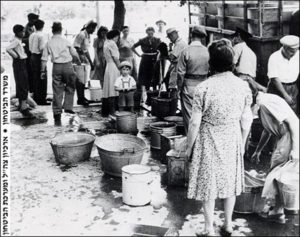 On April 8, 1948 an Arab mine blew up the main water pipeline to Jerusalem at Ras-el –Ain. For seven hours water flooded the fields. The line was finally repaired by the Haganah and British army engineers.
On April 8, 1948 an Arab mine blew up the main water pipeline to Jerusalem at Ras-el –Ain. For seven hours water flooded the fields. The line was finally repaired by the Haganah and British army engineers.
The British authorities claimed that the destruction of the pipeline was accidental and that the Arabs did not know that the pipeline passed under the road at the point where the mining operation took place. But the revelations of British Intelligence on March 12 contradicts the British assertion.
Until the end of World War I Jerusalem was dependent upon wells and cisterns. After World War I Jerusalem began to bring its water from two nearby sources, Solomon’s Pools, south of Bethlehem, and the spring of Ein Farah, six miles from Jerusalem. In 1937 , to meet the needs of a growing population, the Palestine government built a pipeline bringing water from the coastal plain, Ras-el-Ain, forty miles from Jerusalem, which was pumped through the hills to Jerusalem and supplies Jerusalem with 1,500,000 cubic meters of water annually. The pipeline runs entirely through Arab territory. Part of the area through which the pipeline runs was captured by the Jews, but a 20-mile section from Ras-el-Ain to bab el Wad remains under Arab Control, exposing the pipeline to continuous danger of being cut.
The chief victim of an interruption of the water supply would be the Jewish Community of Jerusalem. Most of the Arabs in Jerusalem have cisterns and wells but the fact of the matter is that the threat to the Jerusalem water supply has been so serious and constant as far back as January 1948 negotiation were begun by the Chairman of the Municipal Commission, Mr. R. N. Graves, in an effort to safeguard the water supply station. Ultimately the station at Ras-el-Ain was abandoned to Iraqi armed troops which took over the military camp there. And Mr. Graves withdrew his demand for protection when the Lydda District Commissioner and the military commander of the South Palestine District explained that security forces were not inclined to drive them out by force and Haganah probably could not do so.
Source: The Nation Weekly